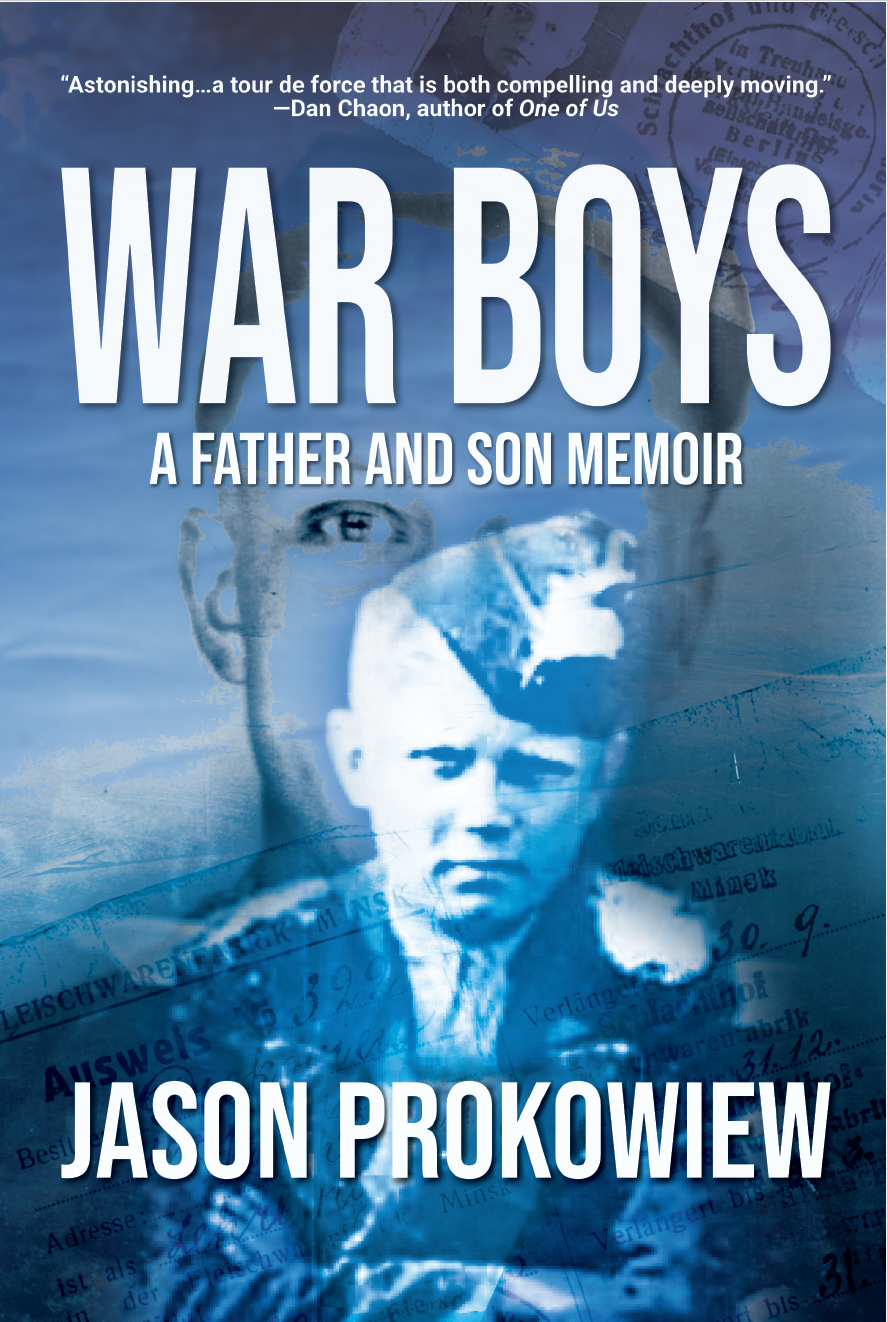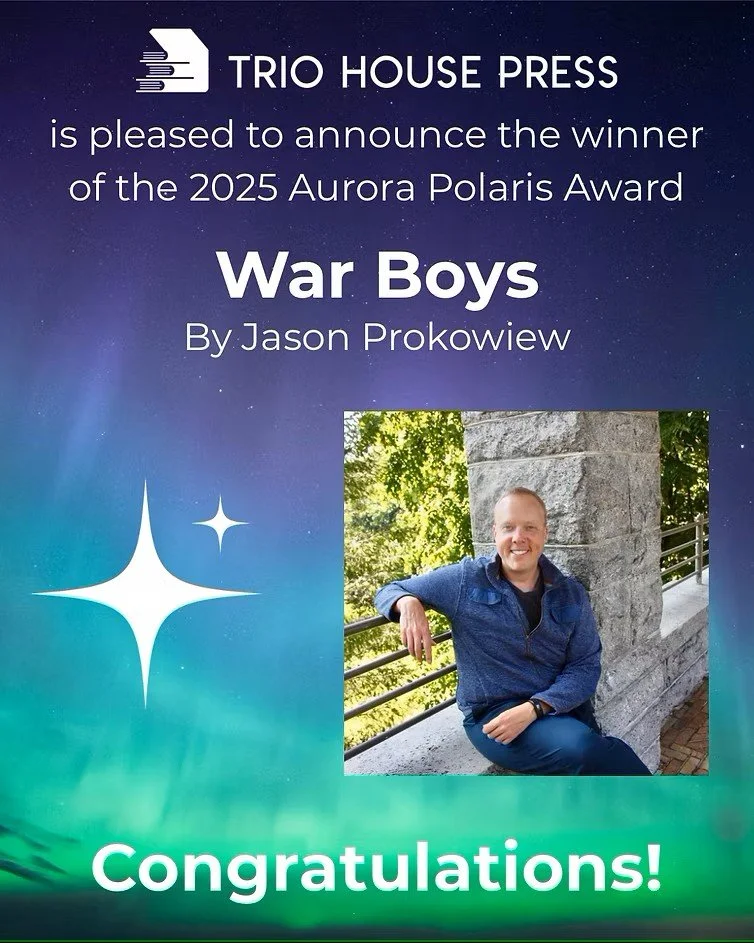early praise for war boys…
-
"This fusion of multigenerational story and global memoir written to reflect the consequences of war on the millions of children displaced by conflict throughout history is 23 years in the making. This gripping book, timely for its anti-war and anti-displacement themes, is also relatable because of its nature as a story about the fraught relationship between a parent and child. Prokowiew grounds his narrative about a young boy growing up in a war, inside the story of a son later interviewing his father about that impossible experience. This story, thanks to Prokowiew’s inventiveness, demonstrates the ways in which a single oral history can touch on the lives of many. And Prokowiew’s own self-reflection on the interview process speaks to the possibilities through which any who desire to learn more about themselves and where they come from can do so as well. Who makes us and how they are made, how the stories they tell can shape the way we see them and the world we live in: this is what oral history is about."
— From the Judges’ Citation for the PEN America/Jean Stein Grant for Literary Oral History
-
"I was riveted and so moved by these scenes…what a fascinating project."
— Melissa Febos, author of Girlhood and Body Work
-
"Jason’s is a story that speaks to the intergenerational impact of war, tracing his father’s experience as a desperate orphan surviving and then escaping Nazi-occupied Belarus and how this experience shaped the abusive suburban American household where Jason was raised. Excavating this past, Jason reveals insights that speak to our present, where hundreds of thousands of refugees are now fleeing a Ukraine under siege. How do we survive war without damaging our humanity, and how can we rout out the traumas of war before they are passed down to our children? Jason’s book is needed."
— Alysia Abbot, author of Fairyland
-
"[War Boys] novel-esque passages are a crowning achievement among several. They are so well-rendered in matters of flow, but also in how seamlessly the interviews translate to stark scenes full of strange, harrowing stakes that steadily escalate, yet never forget the complicated history that stalked every turn of Jason’s father’s youth. It’s an immense testament to Jason’s skill as a writer that those rarely lose sight of the very specific danger Volodya (his father) was thrust into as a child, especially when that danger emerged in the form of help. It’s part of a fascinating, buried motif spanning this twin narrative, that of a kind of nurturing, lined with barbed wires…the scenes where the Jason character found a life he desired (and a home that accepted him), at Oberlin and after, felt like …an utter reward to read."
— Mike Scalise, author of The Brand New Catastrophe
AN EXCERPT FROM WAR BOYS…
The night after I started interviewing my father, I stayed in the bedroom next to my parents’, considering my father as a little boy, coming home after a plane shot at him, to the absence of everything and everyone he’d previously known.
How must that feel to a child, I wondered as I drifted into a broken sleep.
The next day we met in the living room again and I clicked the record button. My father was ready to move forward, to tell what happened next.
“Hold on,” I said, and he looked at me. “How did it feel” to come home from summer camp and find his family gone? “How did it feel,” to see his apartment burned down, and to be alone in a city freshly crawling with war? I leaned back, waiting.
“Why do you keep asking me about the first day?” he snapped with the same annoyed voice he used to tell me I’d overloaded the dishwasher. It was a tone that had often frozen me solid as I considered my next move, fearful of making a wrong one, of putting one too many mugs in the machine, of uncovering the anger from my father that always seemed one mistake away from his surface.
I crossed my arms and looked over the table at him.
He clicked his tongue and scowled. He stood and went to the kitchen. He fixed a cup of coffee his usual way: a splash of cream and two level teaspoons of sugar.
I watched a snowy egret drift across the pond in back of their condo and waited. My mother passed through the room with a pile of laundry in her arms. The tapes rolled and hold stretches of silence interrupted by the clink of his pipe against an ashtray, the striking of a match.
He sat again.
“The next day was just as good. As soon as you see your city almost gone, there is a knot in your stomach. You have that sinking feeling. This just gets worse as you approach your burned-out building. You are hopeful, you are hopeful, you are hopeful, and little by little that last hope is gone, too,” he intoned.
After I’d shut off the tape recorder for that day and sat on the couch with my mom watching the local news, my father sat behind us at the dining table. He tapped his pipe against the ashtray.
“Don’t you feel bad for me? Don’t you?” he asked.
When I turned to look at him, his face scrunched up, his eyes pinched nearly closed and moist, I walked behind him, hugged his neck, and kissed his near-bald head. “Of course I do, Papa, of course I do.”
I couldn’t remember when I’d last seen him cry. At home, sometimes he would turn up the volume on the radio when a Tchaikovsky symphony played, close his lids and gently conduct a sweeping crescendo—his eyes wet; the heft of Russia’s classical composers could take him somewhere he didn’t explain, but it was a place that sometimes, in our living room, I’d see him go to, and my brother and I would watch, and go there with him, the three of us lost in dark heavy chords.
That evening, a nightmare woke me. In it, my father appeared as the pudgy-faced, blond 10-year old I’d seen in a picture, features seen in pictures of me at that age. He was running, ducking, as planes close enough to touch ripped through the sky.
I stumbled to the living room, eyes half-closed, and my father was there packing his pipe with Amphora tobacco. I curled up on the couch and told him of my nightmare, and he confessed he’d had his own. He paced the living room carpet, illuminating his face with the strike of a match.
He looked out the condo window at the moon. Its light reflected off the water of the pond.
“You damn kid,” he muttered, “You’re stirring it all up for me.”
Copyright 2025, Jason W. Prokowiew

